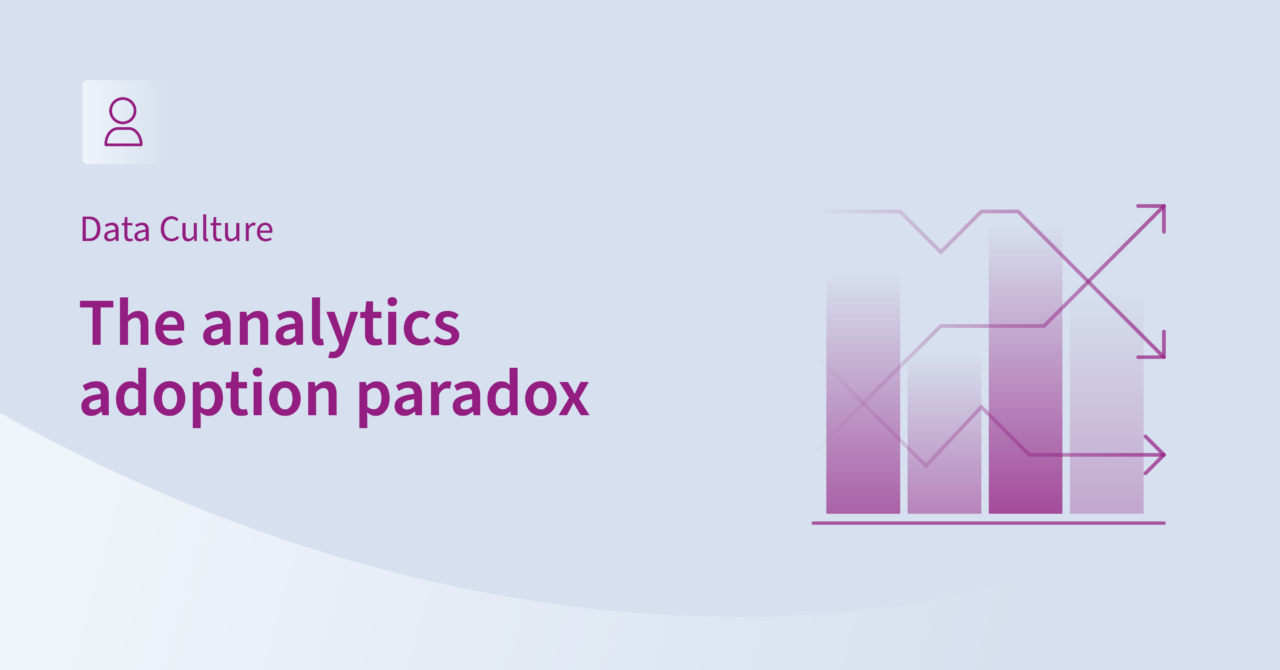The analytics adoption paradox

More companies than ever before have access to data and analytics, but very few of them actually manage to use them effectively. The harsh reality is that organisations seeking to implement large scale transformation programmes don’t always see the returns they had envisioned. Indeed, the average return on “Big Data” initiatives is 55 cents in every dollar.
There is a fundamental disconnect between the resources spent on technology and the people who are supposed to benefit from it. Often there is a surge of buy-in at the beginning, but this tends to tail off as people revert to old beliefs and behaviours. Inevitably, this leads to the programme losing momentum, perhaps even failing entirely.
To mitigate this effect and maintain momentum, organisations should focus on building the right culture, one that integrates data, insights and the experience of work. This means providing quality training and education to their people, selling the benefits of becoming data-centric and empowering them to support the cause.
Sustainable change
To encourage the development of a robust data culture, firms should also focus on observable behaviours; in other words, the experiences people have (or indeed, don’t have) with data, insights and AI as part of their everyday work.
By observing the behaviour of staff on an individual and collective level, leaders can design meaningful interventions that support the programme. Behavioural change must be sustainable; it should be measured over time, monitoring the organization’s “Data Pulse” in order to understand the broader health of its data culture.
We know that behavioural change is crucial when implementing large scale transformation programmes. In practice, this requires a commitment to understanding (and optimising) the attitudes, behaviours and environments people in the organisation encounter on a daily basis. This might sound complicated, but it doesn’t have to be.
A matter of perspective
We see a range of prevailing narratives across global financial services organisations. The fact is that people doing the same roles, using the same tools, and accessing the same data can have very different experiences.
One person might see AI as a positive development that can help them to accelerate decision making and free up time to perform high-value tasks. Someone else might perceive it as a threat to their job and indeed, their entire professional identity. When people struggle to derive actionable insights from technology and data, they build apathy (and sometimes even resentment) towards it.
Over time, negative stories, attitudes and beliefs about the utility of data build up across pockets of the organisation. Focusing on observable behaviours helps us to spot issues with engagement before they become serious problems. Crucially, the process of recording and analysing behaviour people surfaces valuable insights that can scale across the entire firm. It helps leaders to spot problems and make decisive interventions before time and money is wasted.
Scaling the right behaviours
The paradox persists – organisations have unprecedented access to data and analytics, but struggle to get the most out of them. But it doesn’t have to be that way.
Building an effective data culture isn’t just about correcting the wrong behaviours; it’s about encouraging the right ones. It’s possible to use progressive discovery methods to describe desired behaviours and interactions, building a macro view from the perspective of those who are engaging with data on a daily basis. Once we have this visibility over the data landscape – the opportunities and the obstacles – we can encourage desired behaviours and create interventions that mitigate the behaviours we want to see less of.
When it comes to technology, there are no shortcuts. True transformation means leveraging insights from behavioural science and principles of Human-Centred Design to help integrate data into people’s everyday experiences, changing the way they make decisions and use data to drive value.
To unlock the power of data you need to get closer to your people, understanding their hopes, fears and everyday actions, and empowering them with the right training and support. This increases adoption of analytics tools and drives data-driven decision making. And over time, positive experiences will change attitudes and lead to new stories emerging; stories that sustain a strong data culture across the entire organisation.
